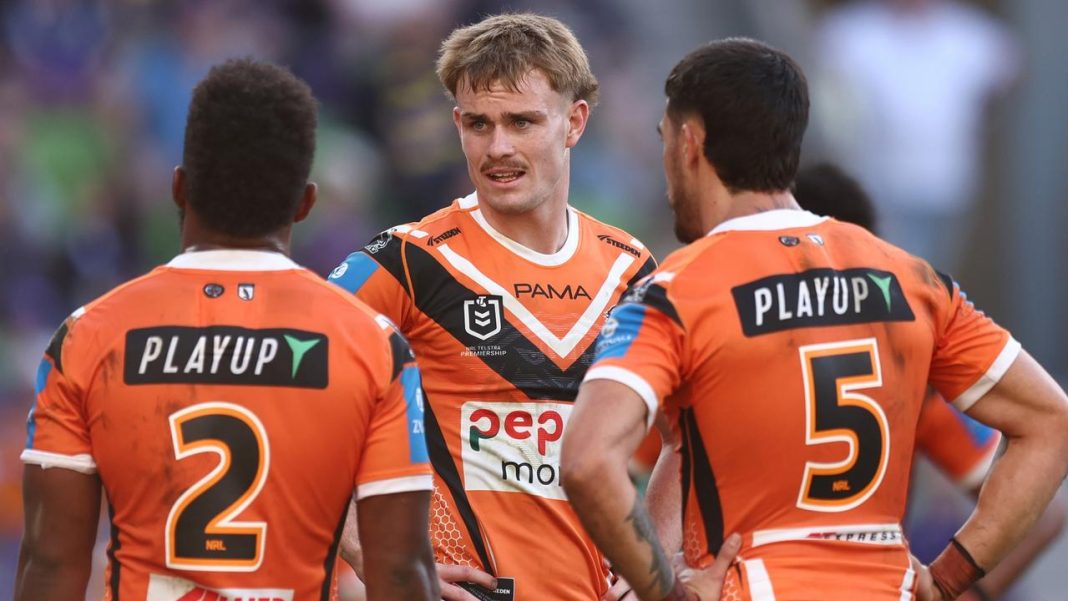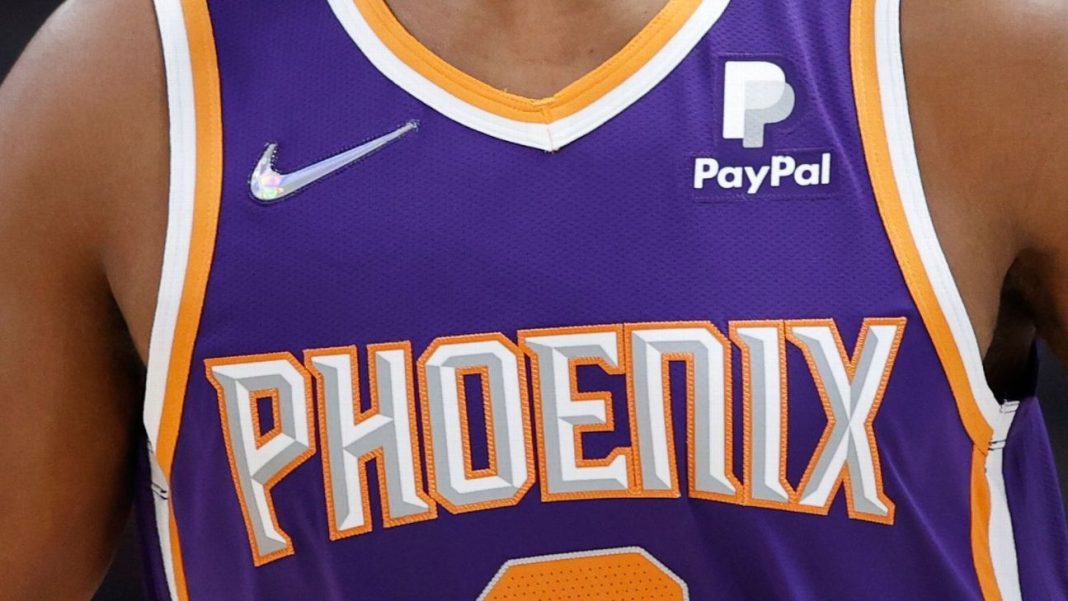“Performance is a very good mask for mental health. If you can keep turning up and doing your job, nobody bothers to ask.”
It’s a sentiment that rings true more and more in the life of professional athletes, with pressures specifically in the NRL at an all-time high.
FOX LEAGUE, available on Kayo Sports, is the only place to watch every game of every round in the 2025 NRL Telstra Premiership, LIVE with no ad-breaks during play. New to Kayo? Get your first month for just $1. Limited-time offer.
For mental health expert Gary Fahey, you have to look no further than Wests Tigers young gun Lachlan Galvin for an example of a player dealing with extreme pressures thrust upon him.
The teenager has seemed to deal with the overwhelming fallout of his contract decision with poise and dignity, according to Fahey.
“I think he’s been quite impressive… he’s done very well to front up in the fact that he turned up to play reserve grade, deal with what was in front of him,” he told foxsports.com.au.
“In a way that doesn’t appear as though he’s hiding but also doesn’t appear as though he’s trying to play down the events (that have taken place).”
But with a mountain of pressure to perform, from the public and media, comes an internal battle which can impact a player’s mental health.
And for Fahey, the accepted dynamic between performance and mental health needs to change. A more proactive approach to better mental health needs to be explicitly viewed by teams and athletes as a performance enhancer, rather than a box to be ticked or something to be addressed when a situation is already dire.
READ MORE
How $4000 private investigator, casino CCTV footage of infamous night saved JT’s career
Why Mam call reeks of desperation; Seibold mystery hidden behind DCE saga — Crawls
The No.1 rated NSW hooker with zero Origin buzz: Top 10 players in every position
Fahey himself is no stranger to mental health battles, having spent 18 years in the Federal Police, spearheading the Prime Minister’s protection team.
Everything he had was wrapped up in what he called a ‘performance based identity’, working at the highest level in his respective field before the impacts of his own battle were laid bare.
His mental health problems resulted in a gambling habit, losing $2 million and ultimately his career before embarking on a path to uncover the root of his problems.
What followed was a masters in brain and mind science and an ongoing PhD in psychology on conscious decision making, becoming an ambassador for the Australian New Zealand Mental Health Association in the process.
Fahey also works with current NRL players, Olympians and golf professionals, so there’s not many better qualified to call for change in the way rugby league helps players’ mental wellbeing.
So what is the root of the problem?
“I think the intricacies of the game are getting a lot more detailed. There’s however many TV shows breaking down performance, breaking down pressures, contracts, those things,” Fahey explained.
“I think with a lot of the guys that I’m seeing, it’s not as though they don’t have coping strategies, they just have never learnt or been taught how to deal with some of these events.
“I think a lot of people mistake high performance as a proxy for mental resilience and forgetting that these guys’ zone of comfort is rugby league, so when things get hard in rugby league, they’re OK to play rugby league.
“But when things get hard outside of rugby league or not specific to their talent, it gets a lot more difficult.
“They worry about speaking to people at the club because their position becomes in jeopardy. They worry about speaking to people outside of the club because you know, we all know, that journalists are very good at finding out information.
“They’re worried about their market value dropping and often what they’re doing is they’re just retreating into themselves.”
Ryles confirms Lomax is ‘ready to go’ | 01:01
The issues that stem from the “performance based identity” also are amplified when a player retires or is dropped, with their identity wrapped up in being an elite athlete.
Then comes the potential harms of drinking, drugs and gambling, which are prevalent when players “lose whatever support network they have” outside their respective clubs.
“With high performers, when they break they almost burn the house down with it. Car accidents, domestic violence, violence. Any of those things,” Fahey said.
“It’s a real issue in a couple of sports, and I’ve spoken to guys at the rugby union players’ association and a lot of former NRL players.
“One of the big issues from a psychology point of view is something we call identity foreclosure. Where a player has a performance-based identity their entire life.
“That identity is wrapped around the thing they do and once that is removed, there’s the inevitable question of, ‘Who I am?’
“But it’s not just that the support network has gone… it’s just that they don’t feel like it’s them anymore. That’s something that gets attached to high performance athletes from a very young age, that is what they are identified as.
“If they play well, they’re a good person. If they play bad, they’re a bad person. If they take a lot of money, they’re selfish. If they stay at a club playing bad, they’re the problem.”
According to the NRL, 2.4 players in every rugby league team will at some point in their life experience depression.
Across Australia in 2023, a total of 2,419 men died by suicide, accounting for 75 per cent of those who took their life that year, according to Life In Mind.
Unfortunately, there’s been several instances of individuals involved in rugby league taking their own lives; from senior figures like Paul Green, to younger men like Mosese Fotuaika.
“There has been up and coming players (commit suicide), there’s been lower grades players, and there’s certainly been past players that have,” Harris said.
“I think if we be honest about the subject, unfortunately, the natural progression of severe mental health issues, whether they be depression, anxiety, or any of those, the natural progression ends at suicide.
“Fingers crossed, and hopefully we don’t get there. But there’s also a lot of damage that can happen on the way to suicide.
“Again, relationship breakdowns, domestic violence, drink driving, car crashes, you name it, all of those things are probably somehow linked to mental health.
“If we can find more voices that resonate, more ways to connect and use the mental health, mental wellbeing discussion as a performance enhancer, then with a bit of luck we don’t end up where nobody wants to.”
Fahey believes professional organisations need to reshape the way they handle their athletes’ mental health.
Instead, of it being a matter of hiring a psychologist, he believes mental wellbeing needs to be proactively framed as a means of improving performance.
With a healthy mind, like a healthy body, a player can perform to the best of their ability. In turn, they then have the coping skills and strategies needed to handle pressure.
“Quite often clubs they pin their hopes on policy and tick and flick boxes, and what I see is that the support networks are there, it’s just not one that resonates with the player,” he said.
“For instance, they will have a really qualified psychologist, but the psychologist hasn’t walked the walk of Lachie Galvin.
“Hasn’t been in a performance field, hasn’t struggled themselves, so doesn’t speak the language. So when the mental health talk happens, 95 per cent of players switch off.
“Because the commentator doesn’t really know how to connect on that level. So I think mental health needs to be more than a tick and flick exercise.
“Mental health or mental wellbeing to me is a performance enhancer. I think the good clubs do this, whether they know it or not. They view mental wellbeing as a performance enhancer.
“Looking after their players, their players’ families. How they feel about themselves, their purpose, their meaning. All of that improves a player’s performance.
“If we start shifting towards that, we’d see better outcomes long-term.”
Horsburgh pushing for Maroons recall | 00:56
To facilitate conversations that are meaningful to rugby league players, Fahey also was of the belief that former players can act as mentors.
He pointed to ex-Roosters stars Todd Carney and Mitchell Pearce, as well as former Test player Darius Boyd, as three players who have been open about their own mental health struggles.
However, those that can assist aren’t limited to just rugby league players.
Athletes from all walks of life, that have dealt with pressure environments could be employed by clubs to level with players and be an experienced sounding board.
“There’s certainly a couple that I know a lot more prominent, someone like Darius Boyd, I know is very vocal about mental health and wellbeing and those sorts of things,” Fahey explained.
“And I know there’s been some players who have had issues that have spoken up, obviously, you know, Todd Carney and Mitchell Pearce are doing some good work now in that space as well and I think that’s very helpful.
“I don’t think we have to zero-in only on former NRL players. I do think that high performance resonates across fields.”
— ARE YOU STRUGGLING AND NEED HELP? CALL LIFELINE ON 13 11 14




